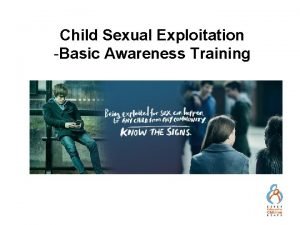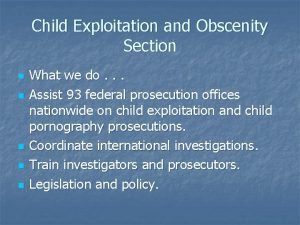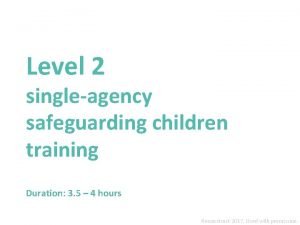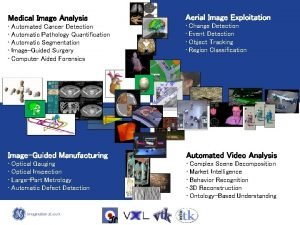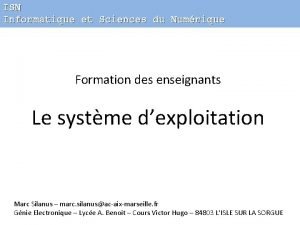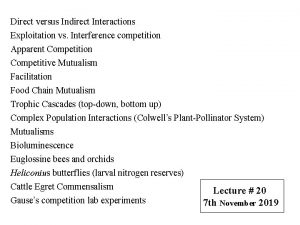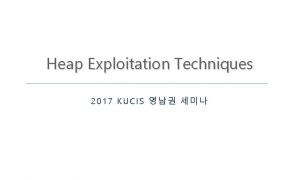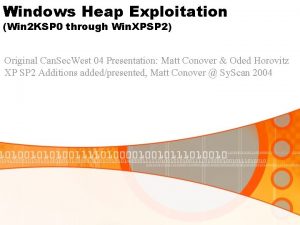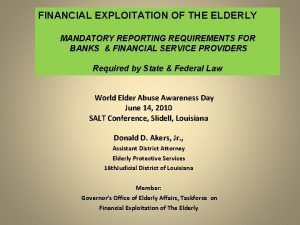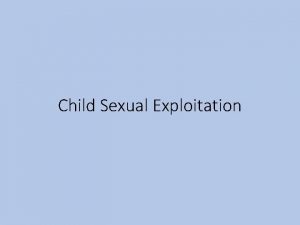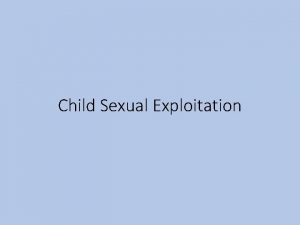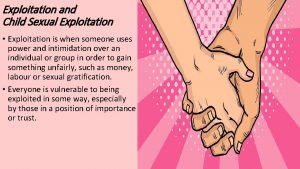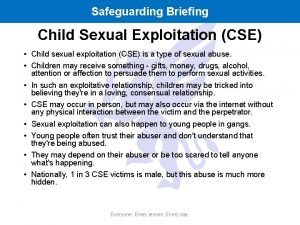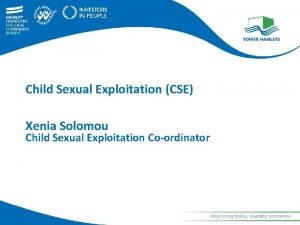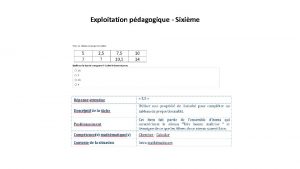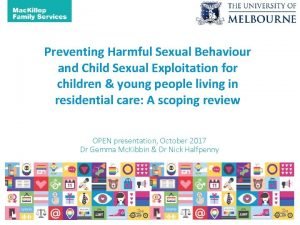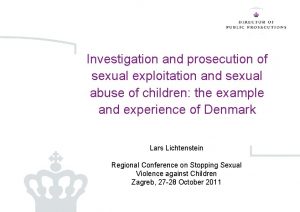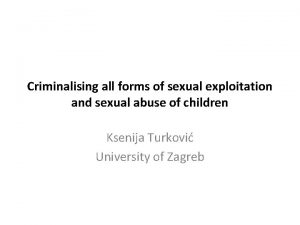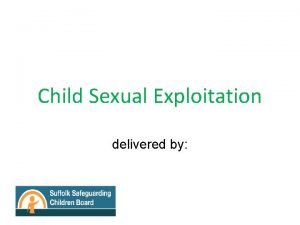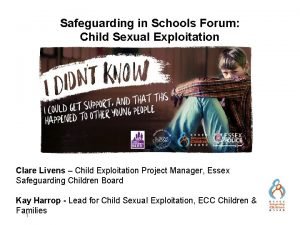Child Sexual Exploitation What is Child Sexual Exploitation
















- Slides: 16

Child Sexual Exploitation

What is Child Sexual Exploitation? In groups brainstorm – What comes to mind when you think of CSE?

CSE occurs throughout the UK affecting boys as well as girls, from any social, ethnic or financial background. It robs them of their childhood and has serious long term effects on every aspect of their lives and may be life threatening. CSE is more than just sexual assault: Perpetrators who sexually exploit children commit multiple crimes when they do so Exploited children may go on to be exploited young adults if they are not supported and helped

• https: //www. youtube. com/watch? v=q. QDYp. Ipgdt. A

Signs and Indicators Physical • • • Unexplained change in appearance and/or behaviour Repeated symptoms of urinary infections Pelvic-inflammatory disease Unexplained injuries Lack of personal hygiene/care Self-harm/attempted suicide Repeated testing for sexually transmitted diseases /pregnancy Repeated pregnancies/miscarriages/terminations Repeated or prolonged alcohol abuse Drug/substance misuse

Psychological • Low self-esteem/low selfconfidence • Poor attachment/attachment disorder • Depression • • • Sleep disorders/nightmares Eating disorders Alcohol/drug/substance abuse Dissociation Psychosis • Post-traumatic stress disorder • Conduct disorder • Living in a chaotic or dysfunctional household (including parental substance use, domestic violence, parental mental health issues) • Mental health problems • Suicidal thoughts/ideation • Multiple personality disorders

Behavioural • Absent from school or exclusion due to behaviour • • • • Staying out overnight with no explanation Receiving gifts from unknown sources Unaccounted for money/goods e. g. mobile phones/credit, drugs or alcohol Change in physical appearance Overtly sexualized dress Having a much older boy or girlfriend Associating with unknown adults; other sexually exploited children or vulnerable children Reduced contact with family, friends and other support networks Getting into cars with unknown adults or associating with known perpetrators Evidence of sexual bullying and/or vulnerability through the internet and/or social networking sites. Gang member or association with gangs Offering to have sex for money/other payment Regularly missing from home or care

Where does CSE happen? Where are children & young people likely to be targeted by perpetrators?

Who is most at risk from CSE? Discuss this with a partner or in a small group

Look at the statements on your table and discuss within small groups Do you agree or disagree with the statements?

INFORMATION SHARING Always share your concerns with your school’s Designated Safeguarding Lead If you suspect that a child or young person is being exploited, this suspicion must be shared with other appropriate agencies, even where there may be issues with consent. Sharing information can mean the difference between life and death for a child or young person. The effective identification, disruption, intervention, protection and prosecution of perpetrators of this crime depend on effective multi-agency working. For further support access the following guide Information Sharing: Advice for practitioners providing safeguarding services to children, young people, parents and carers. www. gov. uk/government/publications/safeguarding-practitioners-information -sharing-advice

What can we do in schools to prevent CSE? • Planned, robust, spiral scheme of work for PSHE Associations – Planning Toolkit for Key Stage 1 to 4 and Character Education programme • Relationship and Sex Education which promotes healthy relationships must begin in primary schools • Lessons about the boundaries between consent and coercion to ensure they understand what it means to get and give consent. • Relationships and sex education should address pornography as this influences young people’s understanding about expectations of sex and attitudes to women and girls. • Explore gender and sexuality- what it is to be male and female – and pressures or expectations to act in certain ways that potentially cause harm to others or oneself.

• Sexting - consider the behaviours of those who manipulate young people into sending images, but also those that share such images without consent. • Awareness raising and other preventative strategies Address running away and related preventative strategies through PSHE. • Internet safety should include how young people can keep themselves safe on social media. • Child Exploitation and Online Protection Centre (CEOP) provides a series of free knowledge sharing events and resources aimed at professionals with a responsibility to safeguard children from child sex offenders. It supports delivery of prevention messages into schools and directly to children and young people through its Thinkuknow educational products and materials provided to teachers for use in classrooms with children and young people. They have developed a wide range of resources including films, lesson plans and online games that focus on children and young people at different key stages

Resources Alice’s diary – Hampshire Police - The aim of the diary is to raise awareness of the signs of child sexual exploitation and help readers recognise the signs in a friend or family member. There are blog entries from Alice, her mother, father, brother and a friend. https: //www. hampshire. police. uk/police-forces/hampshireconstabulary/areas/campaigns/2018/do-you-know-the-signs-of-child-sexualexploitation/ Southend Children’s Safeguarding Board - Southend Local Safeguarding Children’s Board has launched a short film to make children and young people aware of the dangers of online grooming and sexual exploitation. Created by an Essex University student as part of a third year final project, the film features a teenage boy who starts chatting to what appears to be a pretty young girl online. https: //youtu. be/Tum. Tj 51 EEGg

Alright Charlie Free online. This resource is designed for use with children aged 9 -11 in primary schools and aims to highlight the warning signs of grooming in an age appropriate way. The film is seen through the eyes of Charlie who is groomed by Danny. The resource was designed in consultation with CSE professionals, primary school teachers and children in years 5 and 6 in primary schools. The resource is accessible to girls and boys with the viewer never discovering Charlie’s gender. https: //basisyorkshire. org. uk/resource/alright-charlie-cse-primary-school-resource/

NATIONAL CONTACTS NSPCC www. nspcc. org. uk or Tel: 0808 800 5000 Barnardo’s www. barnardos. org. uk Childline www. childline. org. uk or Tel: 0800 11 11 Child exploitation and on-line protection centre (CEOP) www. ceop. police. uk NWG network www. nwgnetwork. org Missing Children helpline: www. missingpeople. org. uk Parents against child sexual exploitation: www. paceuk. info or Tel: 0113 240 5226
 Definition of sexual exploitation
Definition of sexual exploitation Child beauty pageants harmful
Child beauty pageants harmful Child exploitation and obscenity section
Child exploitation and obscenity section Definition of child exploitation uk
Definition of child exploitation uk New entry in entrepreneurship
New entry in entrepreneurship Image analysis and exploitation
Image analysis and exploitation Systeme d'exploitation
Systeme d'exploitation Risk reduction strategies for new entry exploitation
Risk reduction strategies for new entry exploitation Exploitation plan meaning
Exploitation plan meaning Exploitation competition
Exploitation competition Heap exploitation techniques
Heap exploitation techniques Windows heap exploitation
Windows heap exploitation Bilan d'ouverture
Bilan d'ouverture Exploitation of the infirmed
Exploitation of the infirmed Q learning exploration vs exploitation
Q learning exploration vs exploitation Consumer movement
Consumer movement Degression des charges d'exploitation
Degression des charges d'exploitation
